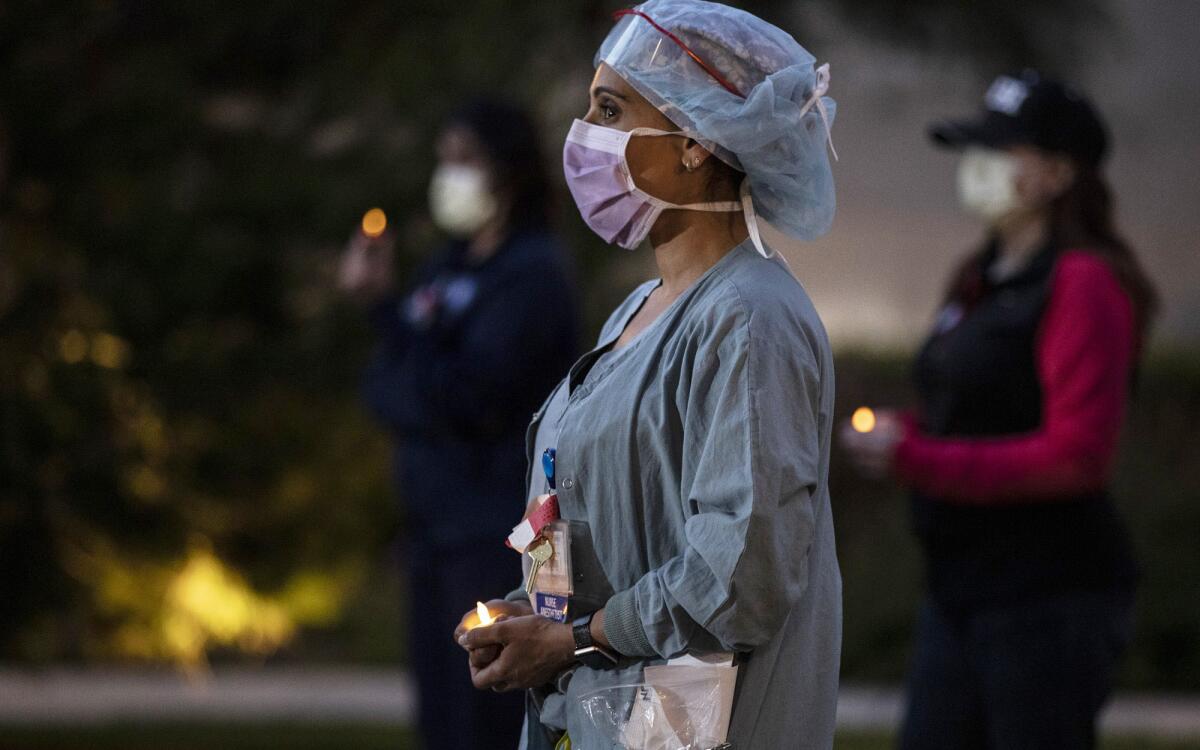The Omicron surge makes the case for California’s single-payer healthcare proposal

- Share via
There has never been a more urgent moment to reimagine healthcare. Two long years into the COVID-19 pandemic, more people are getting sick (thanks to Omicron) and staying sick (thanks to long COVID). A piece of legislation up for debate in the California Assembly on Tuesday, aiming to create single-payer healthcare in the state, couldn’t be more timely.
Assembly Bill 1400 would replace the state’s piecemeal approach to near-universal coverage with a system known as CalCare, making California the first state in the nation to adopt a unified government-funded approach to healthcare. The state would guarantee medical, dental, visual and long-term care for all Californians, regardless of age, employment, income level, marital status, documentation or tribal status. This could finally align our public health strategies, economic health and healthcare system.
The pandemic provides a powerful case study on the need for such an approach: More than 70% of the nation’s largest health insurers have ended their COVID treatment cost waivers, leaving even insured and vaccinated patients with potentially astronomical bills if they require treatment. And make no mistake, many people are going to need a lot of care. The Omicron variant of the coronavirus, responsible for the current surge, is infecting both the vaccinated and the unvaccinated, and we now know that even with mild illness, long COVID occurs in more than half of cases, with impacts across much of the body.
Without coverage like CalCare, this will be a recipe for the virus to go untreated or for patients to face financial ruin. Despite gains promised by the Affordable Care Act more than a decade ago, medical debt is still the leading cause of personal bankruptcy.
Rather than leaving individuals at risk like that, AB 1400 proposes to curb costs by eliminating administrative bloat and setting prices, which as the world’s fifth-largest economy, California can do. Further financing would come through new corporate and progressive taxation.
That’s the scale of systemic solution that is needed in this moment, because entire systems are suffering. As a hospital medicine physician at UC San Francisco, I am watching the pandemic crush our healthcare system and the people inside it, providers and patients alike. Since the beginning of the pandemic, more than 6 million people have had COVID in California alone, with a record half million cases added this last week thanks to Omicron. Beyond healthcare, look at the struggles for schools, travel and essential services.
A single-payer system will curb the influence of profit-seeking businesses that dominate the healthcare industry today. Too often, California’s pandemic response has been shaped not only by science but by healthcare executives protecting corporate interests. For example, elective surgeries have continued during surges to keep money flowing in, even though these procedures drain important pandemic resources and bring increased risk of virus spread in a hospital.
No wonder the U.S. spends more money on healthcare per person than any other country in the world, yet has the lowest life expectancy compared with 11 other comparable nations. Healthcare expenditure is soaring because of higher administrative costs, not better or more services. Even nonprofit systems such as Kaiser have been accused of controlling costs by denying services.
Before the pandemic, corporate health systems closed hospitals to consolidate, leaving many rural Californians without vital services. Such moves have contributed to making healthcare services in California, even accounting for wage differences, among the costliest in the country. Although politicians have been slow to react, healthcare workers have voted with their feet. During the pandemic, staffing cuts to save health systems money left remaining nurses with inadequate support to care for their patients and themselves, driving many to quit. Almost 20% of healthcare workers have left their jobs, and hiring is a struggle. The workers who remain are overburdened.
In a desperate stopgap attempt to save a collapsing system, the California Department of Public Health announced on Saturday that healthcare workers who test positive for COVID but have no symptoms should keep going to work — without a quarantine period and without waiting for a negative test result. Public health officials are under pressure to keep the economy going, but we cannot have a healthy economy when workers are sacrificed and we are all being put at risk.
One can see why AB 1400 is endorsed by the California Nurses Assn.: The healthcare system needs more resources and less profit motive — exactly what CalCare aims to deliver.
Rupa Marya is an associate professor of medicine at UC San Francisco, founder of the Deep Medicine Circle and a co-author of “Inflamed: Deep Medicine and the Anatomy of Injustice.” She is a member of the Healthy California for All Commission.
More to Read
A cure for the common opinion
Get thought-provoking perspectives with our weekly newsletter.
You may occasionally receive promotional content from the Los Angeles Times.






